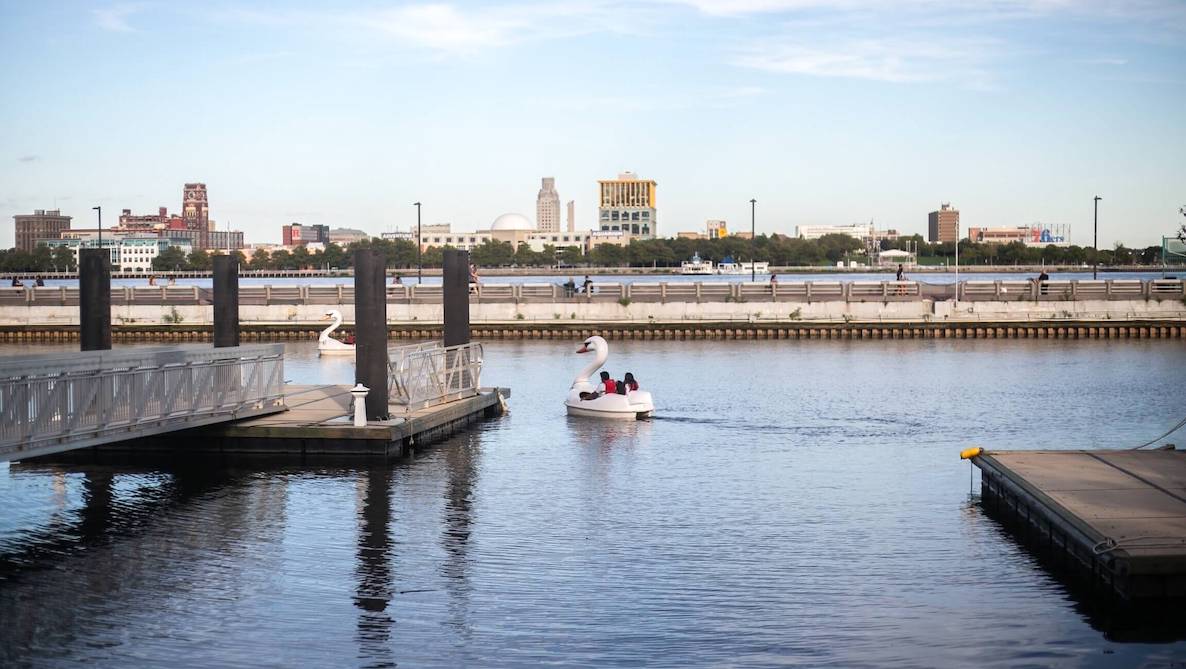The water quality of the Delaware River is the best it has been in decades. Thanks to the efforts of local advocates to secure regulatory safeguards and industry to reduce negative environmental impacts, on- and in-water activities like fishing, paddling, and swimming are on the rise as the river becomes the recreational destination it should be. But pollution risks, intensifying climate change, and severe weather are threatening that progress and further jeopardizing vulnerable communities — particularly communities of color — that are near to the river and have for generations been disproportionately impacted by the negative effects of pollution and environmental hazards.
Philadelphia sits at the midpoint of some 27 miles of Delaware River that run from Trenton, New Jersey, to Wilmington, Delaware. That stretch is susceptible to sewage and stormwater runoff and bordered by heavy industry. According to recent reporting by The Philadelphia Inquirer, 62 sites that use toxic chemicals are situated within one mile of the river.
Despite strict pollution discharge limits under authority of the 1972 Clean Water Act, millions of pounds of toxic materials are still discharged into the Delaware’s water. In addition, these 62 sites operate within the region’s floodplain, which means that even without an accidental spill like last month’s chemical discharge in Bristol’s Otter Creek, there is potential for catastrophic levels of chemicals and hazardous waste to reach the water in the event of flooding, destructive storm surges, and heavy rainfall — all projected to increase in the coming decades.
Much of the river-adjacent industry is surrounded by low-income communities, including communities of color. Many of those communities have been marginalized for generations due to exclusionary zoning practices, housing segregation, and high poverty levels. These neighborhoods have suffered pollution for decades, and future industrial incidents and environmental events represent a further threat to the health, safety, and security of the individuals and families who live there.
When we know that toxic substances and raw sewage are in close proximity to the region’s drinking water supply and to vulnerable populations, and we know that severe weather events like flooding are increasing in frequency because of demonstrated climate change, it’s time for public, private, and nonprofit entities to align efforts to leverage resources and initiatives at federal, state, and local levels.
Advocates here in the region have long been fighting to limit pollution from across Philadelphia to help us meet “fishable” and “swimmable” water quality standards. Where standards are not met, a waterway can be flagged for restoration or remediation, bringing much-needed scrutiny to regulated discharges and vulnerable waste streams. The William Penn Foundation supports several nonprofit organizations in these important efforts. In fact, work is happening now to map and assess industrial risk and to engage neighboring communities to collaboratively develop and advocate for regulatory and risk mitigation policy strategies to prevent catastrophic spills. Efforts like the Green Living Plan for Philadelphia are amplifying the voices of impacted communities in the call for change.
All of this work, along with built and natural infrastructure solutions like floodplain restoration and reforestation, pumping stations, and flood controls, require significant investment and should be prioritized now. The good news? Billions of dollars are available via new federal funding programs like the American Rescue Plan Act, and the city has access to capital markets to expand urgently needed bond funding. City agencies from the Philadelphia Water Department to the Office of Emergency Management should accelerate community engagement and marshal the best possible community-informed projects to enhance climate resiliency and quality of life.
There is significant opportunity now to do more for clean water and for the people most impacted by environmental crises. Philadelphia has an opportunity to lead in and prioritize this work, especially as a new mayoral administration is established. We recommend the following set of actions for city agencies and leadership to protect and conserve water quality in the Delaware River:
-
- Philadelphia should mobilize state and federal funding and access to capital markets to accelerate water infrastructure improvements, including natural infrastructure priorities in the Philly Tree Plan and the Green City and Clean Waters plan, to realize public health and environmental benefits sooner.
- Philadelphia should increase and sustain funding of the community resilience and environmental justice grant fund to provide more support to communities that have been disproportionately impacted by generations of pollution and flooding.
- Philadelphia should prioritize sustainable development across all neighborhoods, especially those along I-95, the Bellwether District, and the Delaware River waterfront, that confront significant flooding risks.
The Bristol spill in March was a near-miss in terms of contaminating our water supply, but it heightened a citizenry’s focus on the fragility of an essential resource it takes for granted. It’s not enough to do as we have done before. Ambitious planning and aggressive investment is required for Philadelphia to enhance its climate resilience and ensure equitable protection across its neighborhoods.
Nathan Boon is the Senior Program Officer of Watershed Protection for the William Penn Foundation. The Citizen welcomes guest commentary from community members who represent that it is their own work and their own opinion based on true facts that they know firsthand.
![]() MORE ENVIRONMENTAL IMPACT FROM THE CITIZEN
MORE ENVIRONMENTAL IMPACT FROM THE CITIZEN



